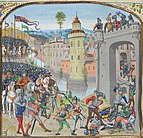From 1345 to 1347, the Hundred Years' War between the English and the French flared up. Determined to renew the conflict, King Edward III of England despatched a small force to south-west France where they won victories at Bergerac and Auberoche. In 1346 an English army of 10,000 men landed in northern Normandy, devastated the region, and stormed and sacked Caen (pictured). They then cut a swath to within 20 miles (32 km) of Paris, turned north, and inflicted a heavy defeat on the French army at the Battle of Crécy. They exploited this by laying siege to Calais. The period from the English victory outside Bergerac to the start of the siege of Calais is known as Edward III's annus mirabilis (year of marvels). After an eleven-month siege, which stretched both countries' financial and military resources to the limit, the town fell, and for more than two hundred years it served as an English entrepôt into northern France. (This article is part of a featured topic: Hundred Years' War, 1345–1347.)
